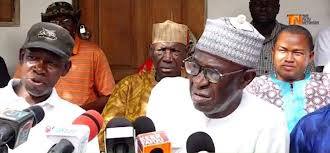 by Alagi Yorro Jallow
by Alagi Yorro Jallow
Mamudu: An apology is a lovely perfume; it can transform the clumsiest moment into a gracious gift. Taking responsibility is the highest mark of great leadership. The executive members of the new leadership of the Alliance for Patriotic Reorientation and Construction (APRC) are not suffering from historical amnesia, the political party and its executive leadership should apologize for the horrors of the twenty -two years of dictatorship and atrocities committed during its rule, such a gesture would have an incredible cleansing effect and then move on towards healing of a divided nation and consolidating new Gambia’s maturing democracy.
Mamudu: Today, awarding former President Yahya Jammeh with a Peace Prize Award by Concerned Gambians without the APRC first apologizing to the Gambian people for the horrors of twenty-two years of malevolent dictatorship and the kleptocratic of the APRC administration is hypocritical and a paradox of our collective consciousness as well as a contradiction of our universal conscience.
Mamudu: All Gambians must remember those whose lives, careers, families Yahya Jammeh and the APRC destroyed. His legacy inescapably shall remain his political clashes, his economic mismanagement, his love for raw and personalized power to the extent of being addressed as most glorious like God.
Mamudu: I love honest people and honest countries even when I do not agree with them, but the Gambia is a hypocrite. A nation is a nation that is honest with itself and ready to face the past and future truthfully. The Gambian people are already canonizing Yahya Jammeh as a saint, and a Peaceful Revolutionary Hero despite complexity only brought brutality from his regime. Thanks to our dishonest political elites. For those of us interested in the truth and memory, we shall not tire in remembering those who suffered under the APRC regime.
Mamudu: Gambians are traumatized people. Twenty-two years of malevolent dictatorship and dehumanization destroyed the soul of our nation. Two-lane roads, infrastructure, a prestigious university, etc. cannot heal sick people. We need healing to become human. That is where the Gambians are, a traumatized people after twenty-two years of dehumanization of hurting ourselves, raping, maiming, killing one another over boundaries and ethnic language group, etc. , confessed criminals, fake degree purchasers, known looters, and all these megaprojects are not healing the soul of our nation.
Mamudu: Describing why an apology would be a smart idea, for example, citing the precedents set by Willy Brandt, the Social Democrat Chancellor of Germany, and Canadian Prime Minister Justin Trudeau by tendering apologies to Poland and India, respectively after extreme atrocities endured under occupation.
The APRC government of President Yahya Jammeh refusals to apologize for past wrongful practices such as human rights and economic atrocities seem unjust. It is surprising, then, that some ethical considerations appear to support such stances.
Mamudu: An apology would be an excellent idea. Some might say, “Well look, you know this happened by President Jammeh and his thugs, why apologize? However, I will point to Willy Brandt, the Social Democrat Chancellor of Germany, going on his knees in the Warsaw ghetto in apology to Poland even though he as a Social Democrat was innocent of all Nazi wrongdoings. I point to Justin Trudeau, the Prime Minister of Canada, who apologized in the Canadian parliament to the Indian people for an incident in which the Canadians had turned away a ship laden with Indian refugees who then met a terrible fate at the hands of the British, as well as on the high seas. They did not directly kill anybody, and yet they felt there was an apology due. APRC should apologize.
Mamudu: An apology and forgiveness are asymmetrical because an apology is based on respect, a perfect duty, and can be a public act, whereas forgiveness is based on love, is an imperfect duty, and is a personal undertaking. It follows from this asymmetry that an apology is a prerequisite for reconciliation, but forgiveness is discretionary. I contend that the new leadership of the APRC is obligated to apologize for past injustices because they are responsible for them, and those official apologies should involve a corresponding expectation for forgiveness.
Mamudu: Forgiveness does not mean excusing unacceptable behavior; it is about healing the memory of the harm, not erasing it. When we forgive, we do not change the past, but we can change the future by taking control of our destructive feelings instead of letting them control us and creating a new way of remembering.
APRC should apologize. It would be a tremendous gesture and would have an excellent cleansing effect. So yes, we think an apology would help:

